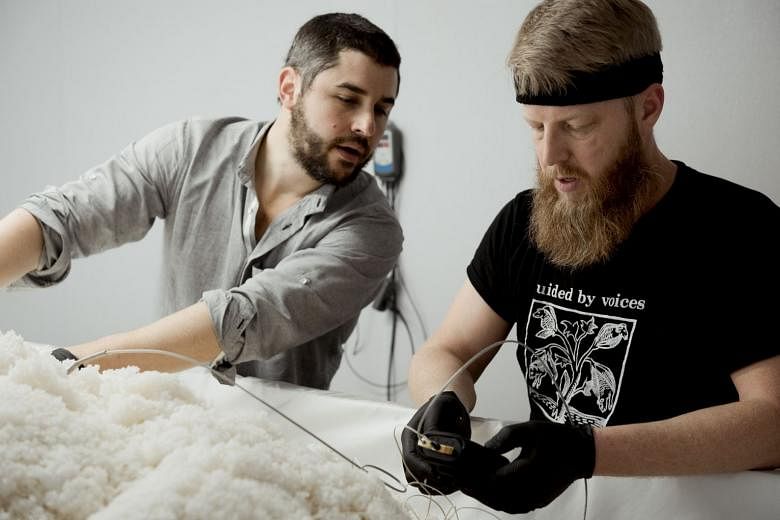NEW YORK (NYTimes) - At first glance, Brandon Doughan certainly fits the mould of the professional brewer in Brooklyn: The Portland, Oregon, transplant has a tidy beard, a penchant for plaid button-downs, and is a former home-brewer well-versed in advanced fermentation.
Yet Doughan - who opened Brooklyn Kura in January with his business partner, Brian Polen - does not produce beer or cider. His calling is sake, the fermented rice beverage that is the foundation of drinking culture in Japan, where it is called nihonshu.
Sake remains a largely untapped frontier in the American craft beverage industry. The country is peppered with small distilleries and beer breweries, but Brooklyn Kura is the first sake brewery in New York state and one of only about 15 in the nation, and that is if you count the four large-scale Japanese producers on the West Coast.
Brooklyn Kura may also be the first to truly impress experts like Chizuko Niikawa-Helton, a certified sake sommelier and consultant who moved to New York from Japan in 2003.
Like many of her peers, Niikawa-Helton takes the diplomatic stance that most small-batch American-made craft sakes are "definitely OK," if not as astounding as those made with the benefit of 1,000 years of experience. She feels differently about Brooklyn Kura. "They brew sakes that are so soft, so gentle," Niikawa-Helton said. "It was my first 'oh, my God' sake which was made in the USA." Doughan, 47, and Polen, 36, decided to open their brewery five years ago, after they met at a mutual friend's wedding in Japan. They toured a traditional small mountaintop operation using one yeast strain, local water, specially grown rice and its own koji, a rice mold that is a key ingredient for brewing sake.
"We were like, 'This is the definition of craft, why aren't people doing this in the US?'" Polen said.
Alcohol-fueled dreams tend to evaporate with the sunrise, but this one stuck. The two kept in touch even after Polen returned to New York, where he worked in analytics and technology for American Express, and Doughan went back to Portland, where he was a biochemist for the Knight Cardiovascular Institute at Oregon Health and Science University.
The first step was making sake at home, said Polen, and "it was better than we expected it to be," especially the sakes made by Doughan. He had both a rigorous science background and 20 years of home-brewing experience, including experimentation with soy sauce, which is also made with a type of koji.
Doughan moved to Brooklyn in 2016, and last September they started outfitting their soaring space in the Industry City warehouse complex in Sunset Park. (Kura refers to a warehouse where products like sake are traditionally made.) Their fellow tenants now share the roasted-chestnut-and-mushroom perfume of Aspergillus oryzae, or koji, growing on steamed, polished rice.
Though it has the alcohol content of wine, sake is brewed more like a beer: Rice implanted with koji mold is slowly mixed with yeast, water and more steamed rice, then fermented for several weeks. It is usually pressed to remove most but not all of the solids, after which it can be aged or filtered further.
The heart of the monthlong process is culturing the koji, Doughan said. It is a multiday, labor-intensive undertaking that begins when he shakes flakes of mold over mini-mountains of washed and steamed rice grown specifically for sake-making.
Doughan and Polen plan to start with more traditional sake styles - still new to most Americans - using their taproom to highlight how they're made. There, they serve shiboritate, or freshly pressed sake, and orizake, a prepressed sake still cloudy and creamy with microscopic particles of rice. They even let customers buy a clay mug of moromi, a thick, tart drink with still-discernible grains straight from the fermenting tank. (Doughan eventually plans to also make more experimental styles, he said, citing the dry-hopped sake made by Setting Sun Sake Brewing Co. in San Diego.) John Gauntner, the Tokyo sake educator who is considered one of the foremost English-language experts on the drink, appreciates their initial focus on the basics. Brooklyn Kura's sake was "very, very good," he wrote in an email, but he was "most impressed that the brewer there wants to get his process down first, reproducibility, and then work on tweaking it to make it better." Though Polen attended Gauntner's sommelier seminars, Doughan is mainly self-taught, with previously unavailable help from YouTube videos and WhatsApp discussions with Japanese brewers. He also served a weeklong internship at a traditional brewery in Japan, and a short stint at the 21-year-old SakeOne brewery in Oregon.
Other brewers around the country have been following their own paths, and Brooklyn Kura likely will not be the sole sake-maker here for long. A company called SakeBrooklyn is working to find a space by the beginning of next year, and the Japanese producer Asahi Shuzo will soon break ground on a large-scale brewery in Hyde Park, near the Culinary Institute of America, which will work with them to develop a sake education program.
It is all evidence of the drink's growing presence in the United States, said Timothy Sullivan, a sake educator and a founder of the new American Sake Association. The group will officially incorporate later this year with the aim of linking brewers, buyers, sommeliers and others in the industry.
Stronger connections are good news for Doughan. "The first thing I learned about sake brewing," he said, "is I'll be learning about it for the rest of my life." -
Brooklyn Kura
Where: 68 34th St. (Third Avenue), Sunset Park, Brooklyn

